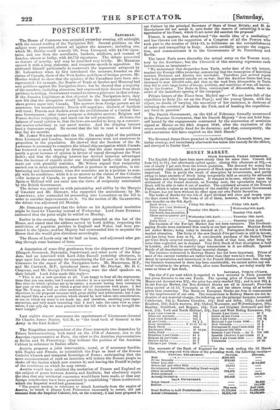The Neapolitan correspondent of the Times transmits two despatches by
Prince Schwartzenberg, both dated on the 17th of January, one to the Austrian representative at Paris, the other to the Austrian representatives at Berlin and St. Petersburg: they indicate the position of the Austrian Cabinet in reference to Italian affairs.
Austria proposes a joint intervention, moral, or if necessary forcible, with Naples and France, to reestablish the Pope as head of the Roman Catholic Church and temporal Sovereign of Rome; anticipating that the mere announcement of such an intention will induce the Roman people to shake off the faction which now coerces it; and leaving the Pontiff to judge of the conditions on which he may return. Austria would have admitted the mediation of France and England on the subject of peace between Austria and Sardinia; but absolutely repels the idea that any territorial concession would have been made, or that any foreign interfel once have been permitted in establishing "those institutions which the Imperial word had guaranteed." "The project tending in substance to detach Lombardy from the empire of Austria, to which it pleases Lord Palmerston incessantly to revert, did not emanate from the Imperial Cabinet; but, on the contrary, it had been proposed to our Cabinet by the principal Secretary of State of Great Britain; and M. de Hummelauer did not accept it, save under the reserve of submitting it to the approbation of his Court, which Ccurt never did sanction the proposal."
France, it appears, has abandoned "the sterile idea of a mediation," and has thrown out the suggestion of a Congress of all the Powers who took part in the treaties of 1814-15, to deliberate on the reestablishment of order and tranquillity in Italy. Austria cordially accepts the sugges- tion, and communicates it to the Governments of St. Petersburg and Berlin.
The latest Paris news discredits the actual entry on the Tuscan terri- tory by the Austrians; but the Chronicle of this morning represents such intervention as imminent-
" We understand that despatches from Turin, under date of the 4th instant, reached the Foreign Office yesterday, announcing that the resumption of hostilities between Piedmont and Austria was inevitable. Travellers just arrived report that both parties appeared equally set on war: that the Austnan forces had been increased to near 100,000 men, and that on the road from Alessandria to Tuna they fell in with large bodies of troops, artillery, and munitions of war, all hasten- ing to the frontier. The Duke de Dino, commandant of Alessandria, made no secret of the immediate opening of the campaign."
Private letters of the Tizzies from Madrid say—" We are here full of the expedition to Italy [to set up the Pope]; and the young Queen, with the object, no doubt, of varying the monotony of her existence, is desirous of imitating the conduct of Isabella the First, and of heading the expedition- ary force in question."
The Danish Government, on the 23d of February, formally announced to the Prussian Government, that his Danish Majesty "does not hold him- self bound by the engagements contracted by the convention of armistice signed at Malmo on the 26th August 1848, after the expiration of the seven months originally fixed for its duration; and that, consequently, the said convention will have expired on the 26th March."


























 Previous page
Previous page